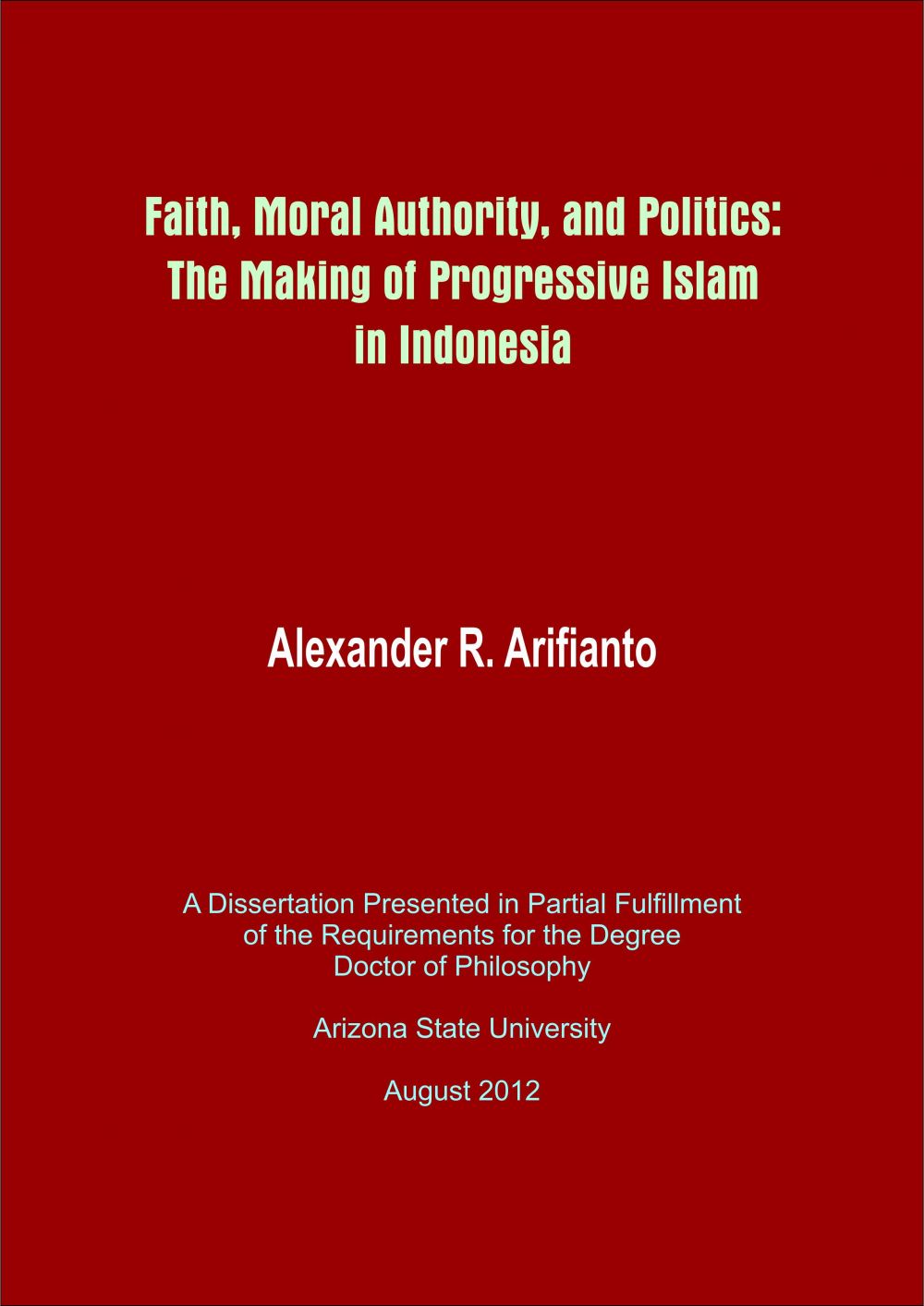Faith, Moral Authority, and Politics: The Making of Progressive Islam in Indonesia
Dibaca: 1227
Penulis : Alexander R. Arifianto
Faith, Moral Authority, and Politics: The Making of Progressive Islam in Indonesia
by Alexander R. Arifianto
ABSTRACT
Several Islamic organizations have experience major changes in their theological frames and political identities away from fundamentalist and revivalist theological orientation to one that embraces a progressive Islamic theology that synthesizes these norms with classical Islamic teachings. What are the factors that explain these theological changes? What are the causal mechanisms that help to promote them? Using the moral authority leadership theory, I argue that Islamic groups would be able to change their theological frames and political identities if the changes are promoted by religious leaders with 'moral authority' status, who are using both ideational and instrumental strategies to reconstruct the theological frames of their organizations. In addition to moral authority leadership, intermediary variables that also affect the likelihood of a theological change within Islamic groups are the institutional culture of the organization – the degree of tolerance for non-Islamic theological teachings - and the relationship between the Islamic group and the state.
This study is a comparative historical analysis of two Indonesian Islamic groups: the Nahdlatul Ulama (NU) and the Muhammadiyah. It finds that the NU was able to successfully change its theological positions due to the presence of a charismatic moral authority leader, the tolerant institutional culture within the organization, and the ability of the organization to ally with the Suharto regime, allowing the reform to be institutionalized with little intervention from the regime. On the other hand, theological reform within the Muhammadiyah was not successful due to the lack of a leader with moral authority status who could have ii led the reforms within the organization, as well as to the dominance of a revivalist institutional culture that does not tolerate any challenges to their interpretation of Islamic theology. The analysis makes theoretical contributions on the role of religious leadership within Islamic movements and the likelihood of Islamic groups to adopt liberal political norms such as democracy, religion-state separation, and tolerance toward religious minorities. It identifies the mechanisms in which theological change within Islamic group become possible.
TABLE OF CONTENTS
CHAPTER 1: INTRODUCTION - 1
CHAPTER 2: LITERATURE REVIEW, THEORY, AND METHODOLOGY - 22
Review of Competing Explanations - 23
Political Culture (Culturalist) Approach - 23
Rational Choice (Rationalist) Approach - 27
Social Constructivist Theory - 35
Weberian Charismatic Leadership Theory - 42
Theoretical Framework and Hypotheses - 47
Conceptualizing Political Islam - 51
Theorizing Moral Authority - 55
Intervening Variables - 61
The Institutional Culture of the Organization - 63
Relations between the State and the Religious Organization - 66
Dependent Variable - 70
Causal Mechanisms for Successful and Unsuccessful Theological Change - 74
Research Methodology - 77
Case Selection and Justifications - 78
Data Sources - 81
CHAPTER 3: THE SUCCESSFUL REFORM PATHWAY: THE CASE OF THE NAHDLATUL ULAMA - 86
Historical Background of the Theological Reforms Within the NU - 90
Analysis of Theological Change within the NU - 110
Abdurrahman Wahid’s Moral Authority Leadership - 110
Tolerant Institutional Culture within the NU - 126
NU’s Relations with the Indonesian State - 130
Alternative Explanations on Theological Reforms within the NU - 136
Culturalist Explanation of the NU Reform - 138
Rationalist explanation of NU’s theological reform - 141
Conclusion - 147
CHAPTER 4: THE UNSUCCESSFUL REFORM PATHWAY: THE CASE OF THE MUHAMMADIYAH - 154
Historical Overview of Theological Reform within the Muhammadiyah - 158
Analysis of the Theological Reform within the Muhammadiyah - 176
Religious Leadership of Nurcolish Madjid and Syafii Ma’arif - 176
The Impacts of Puritanist/Revivalist Institutional Culture - 181
Relations between the Muhammadiyah and the Indonesian State - 196
Alternative Explanations on the Theological Reform within the Muhammadiyah - 202
Culturalist Explanation - 194
Rationalist Explanation - 198
Conclusion - 203
CHAPTER 5: CONCLUSION - 210
Review of Empirical Findings - 210
Theoretical Contributions - 228
Future Research - 231
REFERENCES - 233
or HERE
Tags: FaithMoralAuthorityandPoliticsTheMakingofProgressiveIslaminIndonesia , AlexanderR.Arifianto , ArizonaStateUniversity








